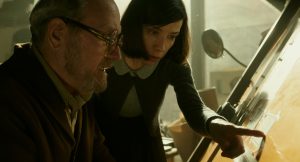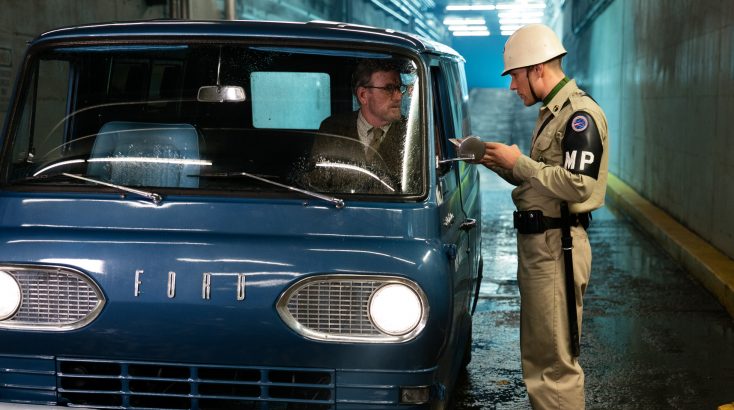
Richard Jenkins and Sally Hawkins in the film THE SHAPE OF WATER. ©20th Century Fox CR: Kerry Hayes.
By ANGELA DAWSON
Front Row Features
HOLLYWOOD—Oscar nominee Richard Jenkins has been an actor for nearly 50 of his 70 years. The soft-spoken thespian began his career onstage appearing in regional theater productions. It wasn’t until 1985 that he made his big screen debut in the Lawrence Kasdan Western “Silverado.” In subsequent years, he has bounced back and forth between performing live on stage and delivering memorable performances on the big and small screen. One of his most notable TV characters was playing ghostly family patriarch Nathanial Fisher on the acclaimed drama “Six Feet Under.”
The workhorse actor received his first Academy Award nomination for his starring role in 2008’s thought-provoking immigration drama “The Visitor,” playing a kindly widower who tries to help a pair of refugees facing deportation from the U.S. He now has a supporting role as an advertising illustrator trying to get back on his feet and helping a friend who has fallen in love with an amphibious creature in Guillermo del Toro’s much-hailed “The Shape of Water.” The film is up for 13 Oscar nominations, including Best Picture.
Jenkins, whose humble Midwestern roots are evident from the first moment you meet him, spoke last November about working with the filmmaking auteur, playing a gay man facing societal challenges in the early 1960s, working alongside co-star Sally Hawkins (also nominated for an Academy Award for her performance in the film) and the changes going on in Hollywood.
Q: Did Guillermo del Toro give you a biography for your character?
Jenkins: I did, but he also said, “You can either take it or leave it.” I usually choose not to (look at the backstory) because I look for everything in the script. It has to be on the page for me. If it’s on the page, then it’s in the movie. If it’s in your biography, it’s not in the movie. If it’s not in the movie, then it just becomes confusing. So, the gold is in the script—what people say about you, what you do, what you say, where you live, what your house looks like—that’s where the character is born and comes to life.
The backstory is almost like a novel. That’s where it would be and it would be helpful to the reader. I’ve had examples where I have a limp in the backstory and if you put it in the movie then the audience will be wondering, “Why is he limping?” because you don’t talk about it in the movie and it’s a distraction sometimes.
But Guillermo is so enthusiastic about these characters. He lives with them and breathes with them.
Q: What was it like working with Sally Hawkins? Did you already know her before making this film together?
Jenkins: We were supposed to do a movie together a few years ago but it didn’t happen. For this, we had rehearsals and hung out. I thought it was important, and she did too, that we become friends, and she’s not hard to be friends with. She’s just there: fabulous. I said to her after working with her for four days, “You’re my friend now. There’s nothing you can do about it.” I found myself looking at her face a lot. Often, when you’re working with an actor who has lines, just as in life, you don’t always look at them when you’re talking to them. You do other things because you can hear them. But if you wanted an answer from Sally, you had to look at her (because her character is mute). And she has a face to get lost in.
Q: Could you talk about playing a gay man in a society where he is not accepted? In 1962, he had to hide his sexual identity.
Jenkins: It’s something he’s had to hide his whole life so it’s fairly second nature to him. At that time, to be able to reach across the table and put your hand on another man’s hand—that’s a huge risk. Putting him in that time period changes everything—what he talks about and who he talks to. That’s one of the reasons he’s alone. It’s easier to be alone than to be found out or to be outed. It just added another dimension to playing this guy. You were aware that nobody knew you were gay. So, how do you form a relationship with someone you don’t know is gay.
This guy wants to connect with someone so much and he found it through Sally, but he has to go through (his journey) to realize it.
It didn’t occur to me until about a week into shooting that (the film is set) in 1962. It changed everything. It changed how people looked at us. It made us invisible. That’s what (del Toro) wanted this movie to be about. “Make America Great Again”—that’s the time they’re talking about. If you were a straight white man, it was a great time but if you were anybody else, it was not so terrific.
Q: Did you have to learn sign language for your scenes with Sally Hawkins (who plays a mute)?
Jenkins: I had to learn not to get ahead of her or behind her. You’ll see in the movie, sometimes I get ahead of her and then she goes back (hits his hand when she’s angry) and she signs again. We probably rehearsed that scene for two weeks. Everyday. A lot. When we shot it, it was nothing like our rehearsals. It was so fantastic.
Q: The scene with your former advertising agency boss seems to hint at a possible intimate relationship that he now regrets, which may be why he doesn’t want you back at the firm. Is that how you saw it?
Jenkins: Yeah. That was something that was in the script. It was never talked about directly but as soon as I began rehearsing with the actor, I thought, “These guys had something at one time.” When I say to him, “I want to come back,” I don’t mean just to the ad agency.
Q: What do you make of the relationship between Sally’s character and the creature?
Jenkins: There’s something really smart with Guillermo in making the relationship between the creature and Sally’s character work. Somebody in the movie sees it—me—and accepts it. I close the door to the bathroom when I see them in there. That’s important for the audience to see somebody in the film accepting these two together. That’s really smart and just an example of what Guillermo does all the time.
Q: You’ve had quite a long and successful career. When you’re out in public, what do you get noticed for most?
Jenkins: It depends on the age group. With kids, it’s “Stepbrothers.” With older couples and middle-aged couples, it’s (the 2014 TV miniseries) “Olive Kitteridge” and “The Visitor.” I don’t go to geek-fests.
Q: Do you get noticed for your voice because it’s so distinctive?
Jenkins: Yeah, sometimes in the grocery store. When I’m in line, I might say something, and another customer will turn around and say, “I knew it was you.”
Q: The entertainment industry is undergoing changes now with the Times Up movement, which calls for equality pay and better treatment of women. What do you think of what’s going on?
Jenkins: I think it’s that way in America, in general. We do go forward. Sometimes it seems like we don’t, but we do inch forward. It happened after the election with the march. That’s when women said, “no more.” It’s sad. You hate to see it. But there it is. It’s not just in (show business). It’s everywhere.





